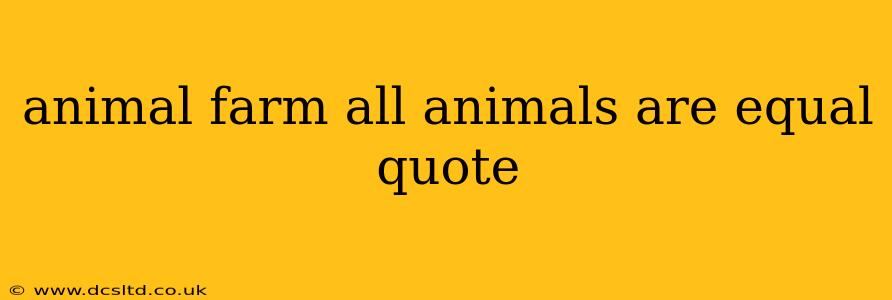George Orwell's Animal Farm is a timeless allegorical novel, and its most famous line, "All animals are equal, but some animals are more equal than others," encapsulates the book's central theme: the corruption of power. This seemingly paradoxical statement has sparked countless discussions and interpretations, and understanding its context within the novel is crucial to grasping its full meaning. This article will delve into the quote's significance, explore its evolution throughout the story, and answer some frequently asked questions.
What Does "All Animals Are Equal" Actually Mean in Animal Farm?
On the surface, the initial proclamation of "All animals are equal" represents the idealistic vision of Old Major, the prize-winning boar who inspires the animal rebellion. It symbolizes a society founded on principles of fairness, equality, and mutual respect, free from the oppression of human farmers. Each animal contributes according to their ability and receives according to their need – a utopian dream shared by all the animals before the revolution. This initial declaration is a powerful rallying cry, a promise of a better future.
However, as the pigs, led by Napoleon, gradually seize control, the meaning of this statement undergoes a profound transformation. The equality it initially represents is systematically eroded through manipulation, propaganda, and outright tyranny. The pigs' increasingly opulent lifestyle directly contradicts the core principle of equality, showcasing the inherent dangers of unchecked power and the fragility of utopian ideals.
How Does the Quote Change Throughout the Novel?
The quote's evolution is arguably the most powerful aspect of Orwell's narrative. It's not simply a static phrase; it becomes a tool of manipulation. Initially a genuine expression of hope, it's gradually twisted into a cynical justification for the pigs' actions.
The pigs cleverly use slogans and propaganda, such as the alteration of the Seven Commandments (the rules governing Animal Farm), to manipulate the other animals. Initially, the commandment "All animals are equal" is a fundamental principle. However, as the pigs gain power, this commandment is subtly altered, ultimately replaced by a version which states that all animals are equal, but some animals are more equal than others. This final, cynical twist illustrates the pigs' complete disregard for the original principles of the rebellion.
Why is "All Animals Are Equal, But Some Animals Are More Equal Than Others" So Important?
The altered version of the quote acts as a chilling summation of the novel's overarching theme: the hypocrisy and corruption inherent in totalitarian regimes. It reveals the deceptive nature of power and its ability to twist even the most noble ideals into justifications for oppression. This ironic twist is a powerful reminder of how easily ideals can be corrupted and how important it is to remain vigilant against those who abuse their power.
What is the Significance of the Seven Commandments in Animal Farm?
The Seven Commandments are initially the foundation of Animal Farm's society, a set of principles meant to ensure equality and fairness for all animals. However, their progressive alteration and eventual manipulation by the pigs, specifically Napoleon and his inner circle, are key to understanding the novel's message of totalitarian control. As the pigs gain power, the commandments are changed to suit their needs, subtly erasing the egalitarian values established at the outset of the revolution.
Is Animal Farm a Satire?
Yes, Animal Farm is a satirical allegory. Orwell masterfully uses animal characters to satirize the events of the Russian Revolution and the rise of Stalinism in the Soviet Union. The pigs represent the Bolshevik party, with Napoleon embodying Stalin, while other characters represent key figures from that era. The satire lies in the stark contrast between the animals' initial idealistic aspirations and the harsh reality of their subsequent oppression. The novel's enduring power comes from its ability to warn against the dangers of unchecked power and totalitarian regimes, remaining relevant even today.
Conclusion:
The phrase "All animals are equal, but some animals are more equal than others" from Animal Farm transcends its fictional context. It serves as a potent warning about the dangers of absolute power, the seductive nature of propaganda, and the ease with which utopian ideals can be corrupted. The quote's enduring power lies in its ability to encapsulate the core message of Orwell's novel: the fight for equality is a constant struggle, and vigilance against those who seek to exploit it is crucial.
